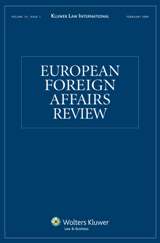
Expectation management? Contrasting the EU’s 2030 Agenda discourse with its performance in evaluating policy coherence for development
Keijzer, NielsExternal Publications (2017)
in: European Foreign Affairs Review 22 (2), 177–195
The United Nations 2030 Agenda for Sustainable Development starts from the premise that global development depends equally on domestic policy action as on international cooperation. The EU strongly pushed for such a ‘universal’ agenda and called for reviewing the alignment of existing policies to the new agenda in reference to its legal commitment to promoting Policy Coherence for Development (PCD). This article analyses key trends in development evaluation since the 1980s, operationalizes the concept of PCD for evaluation purposes, and assesses the EU’s evaluation performance. The findings show a discrepancy between the Union’s ambitious 2030 Agenda position and its sub-optimal performance in evaluating PCD. Instrumental use of PCD in international negotiations to push for burden-sharing in development cooperation, an evaluation function focused on defending spending, diverging Member State support, as well as sheer methodological challenges explain this discontinuity that affects the EU’s credibility as a norm maker.
